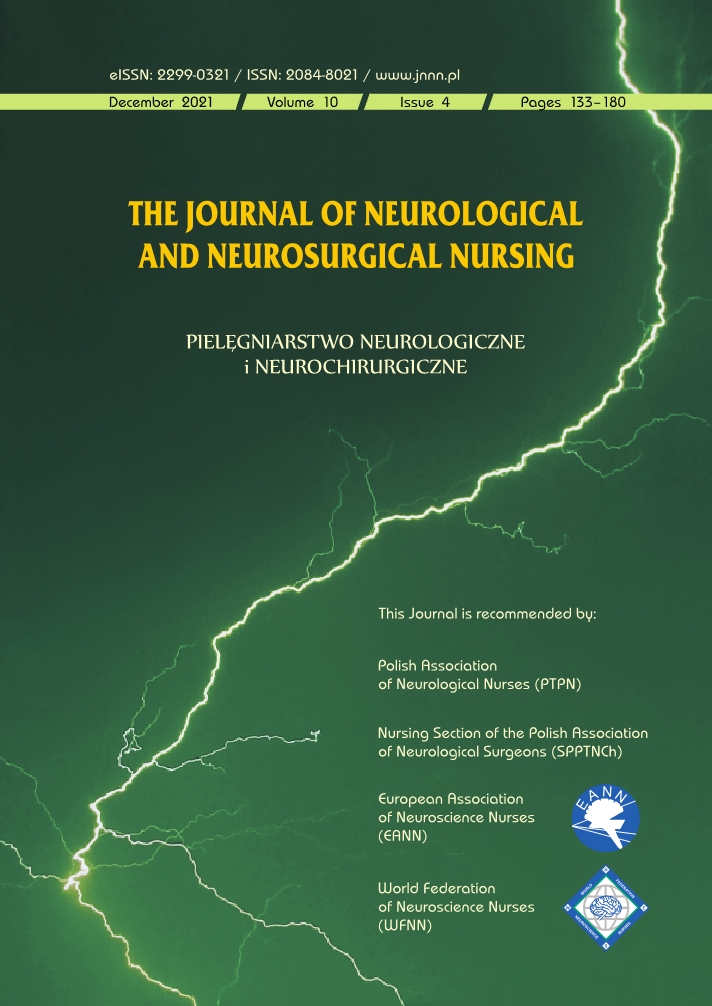Wpływ stopnia obciążenia opiekunów osób z chorobą Parkinsona na jakość ich życia
DOI:
https://doi.org/10.15225/PNN.2021.10.4.2Słowa kluczowe
obciążenie opieką, opiekun, choroba Parkinsona, jakość życiaAbstrakt
Wstęp. Choroba Parkinsona jest jednym z najczęściej występujących chorób neurodegeneracyjnych. Schorzenie to występuje w charakterze postępującym. Określa się, że na chorobę Parkinsona chorują w Europie głównie osoby powyżej 60 roku życia. Zakłada się, że w Polsce na chorobę Parkinsona obecnie choruje około 80–100 tys. osób. Choroba dotyka głównie mężczyzn.
Cel. Ocena poziomu obciążenia opiekunów w opiece nad osobami z chorobą Parkinsona oraz ocena ich jakości życia.
Materiał i metody. Badania zostały przeprowadzone w Kole Przyjaciół Ludzi z Chorobą Parkinsona TWK we Wrocławiu oraz w Leszczyńskim Stowarzyszeniu Osób z Chorobami Alzheimera i Parkinsona w Lesznie na grupie 92 chorych na chorobę Parkinsona oraz ich 92 opiekunów. Badanie przeprowadzono za pomocą metody sondażu diagnostycznego z wykorzystaniem kwestionariusza ankiety własnego autorstwa oraz następujących wystandaryzowanych narzędzi dla opiekunów: kwestionariusza WHOQoL-BREF, skali obciążenia opiekunów CBS oraz skali lęku i depresji HADS. W niniejszej pracy wykorzystano również kwestionariusze skierowane do chorych na chorobę Parkinsona: ankietę socjodemograficzną, kwestionariusz jakości życia PDQ-39, skalę określającą stadium zaawansowania choroby według Hoehn–Yahra oraz skalę depresji Becka BDI.
Wyniki. Analiza materiału badawczego wykazała, że: jakość życia opiekunów w dziedzinie fizycznej, środowiskowej i psychologicznej była istotnie lepsza u osób sprawujących tę opiekę od 1–5 lat, niż u opiekunów zajmujących się chorymi ponad 10 lat. Badania własne wykazały, że obciążenie ogólne wśród opiekunów było istotnie większe gdy pacjent chorował ponad 5 lat, niż gdy chorował od 2–5 lat oraz stwierdzono, że im niższy ogólny poziom jakości życia i nasilenie objawów depresji wśród chorych na PD, tym gorsza jakość życia ich opiekunów. Na skali obciążenia ogólnego 47 spośród 92 uczestników ankiety (51,09%) miało średni poziom obciążenia, 24 ankietowanych (26,09%) miało wysoki poziom obciążenia. Ponadto długotrwały czas trwania choroby skutkuje wyższym poziomem obciążenia opiekunów.
Wnioski. Trudności związane z obciążeniem opieką opiekunów osób chorujących na PD stanowią istotny problem kliniczny, społeczny a także ekonomiczny. Co więcej w istotny sposób wpływają na obniżenie jakości życia opiekunów niejednokrotnie odbierając im radość czerpaną z opieki nad najbliższymi chorującymi na chorobę Parkinsona. (PNN 2021;10(4):144–152)
Bibliografia
Bitner A., Zalewski P., Klawe J.J., Pawlak J., Tafil-Klawe M., Kędziora-Kornatowska K. Nowe metody leczenia choroby Parkinsona. Alter Ego Seniora. 2013;1(3):135–137.
Wieczorek D., Sitek E.J., Wójcik J., Sławek J. Łagodne zaburzenia funkcji poznawczych i otępienie w chorobie Parkinsona — obraz kliniczny i aktualne kryteria diagnostyczne. Pol Prz Neurol. 2013;9(3):96–104.
Golińska P., Bidzan M. Poczucie obciążenia opiekunów osób z chorobą Parkinsona. Przegląd badań. Geriatria. 2017;11(1):22–28.
Dbając o opiekuna. Kwartalnik Parkinson — Polska. 2010;1:13–15.
Clarke C.E., Patel S., Ives N. et al. Clinical effectiveness and cost-effectiveness of physiotherapy and occupational therapy versus no therapy in mild to moderate Parkinson’s disease: a large pragmatic randomised controlled trial (PD REHAB). . 2016;20(63):1–96.
Lee J., Kim S.H., Kim Y., Kim Y.L., Sohn Y. Quality of Life of Caregivers of Individuals With Parkinson’s Disease. Rehabil Nurs. 2019;44(6):338–348.
Pooyania S., Lobchuk M., Chernomas W., Marrie R.A. Examining the Relationship Between Family Caregivers’ Emotional States and Ability to Empathize with Patients with Multiple Sclerosis: A Pilot Study. Int J MS Care. 2016;18(3):122–128.
Karakiewicz B., Stala C., Grochans E. i wsp. Ocena wpływu wybranych czynników socjodemograficznych na jakość życia osób chorujących na stwardnienie rozsiane. Rocz PAM. 2010;56(3):107–112.
Szluz B. Opieka nad osobą z chorobą Parkinsona w percepcji opiekuna rodzinnego. Roczniki Teologiczne. 2019;66(1):63–74.
Perek-Białas J., Stypińska J. Łączenie pracy i opieki nad osobą starszą — wpływ na jakość życia opiekuna. W: Kałuża D., Szukalski P. (Red.), Jakość życia seniorów w XXI wieku. Ku aktywności. Wydawnictwo Biblioteka, Łódź 2010;136–148.
Grabowska-Fudala B., Jaracz K. Obciążenie osób sprawujących opiekę nad chorymi po przebytym udarze mózgu. Udar Mózgu. 2006;8(1):42-47.
Tew E.H., Naismith S.L., Pereira M., Lewis S.J. Quality of life in Parkinson’s disease caregivers: the contribution of personality traits. . 2013;2013:151872.
Sobstyl M. Subiektywna i obiektywna ocena jakości życia po jednostronnej talamotomii u chorych z drżenną postacią choroby Parkinsona. Post Nauk Med. 2006;4:144–148.
Martinez-Martin P., Arroyo S., Rojo-Abuin J.M., Rodriguez-Blazquez C., Frades B., de Pedro Cuesta J. et al. Burden, perceived health status, and mood among caregivers of Parkinson’s disease patients. Mov Disord. 2008;23(12):1673–1680.
Pobrania
Opublikowane
Jak cytować
Numer
Dział
Licencja

Utwór dostępny jest na licencji Creative Commons Uznanie autorstwa – Bez utworów zależnych 4.0 Międzynarodowe.
Statystyki
Liczba wyświetleń i pobrań: 585
Liczba cytowań: 0
